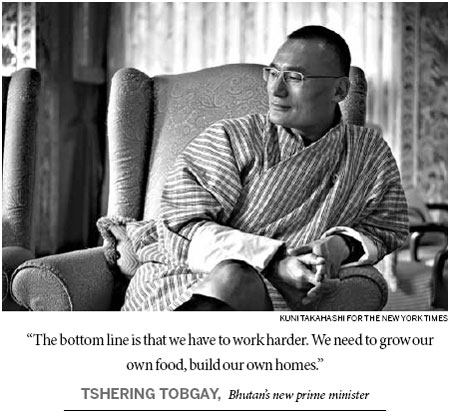A new leader in Bhutan, moving past mere happiness
Updated: 2013-10-13 08:24
By Gardiner Harris(The New york Times)
|
|||||||
THIMPHU, Bhutan - This country of 725,000 people, known above all for its happiness index, is going through one of the most thorough transformations in the world. It had a feudal system until 1953, its first road was built in 1962, and now a new leader is pushing the country in new directions.
"In the last few years, we have transformed beyond recognition," said Tshering Tobgay, 48, the new prime minister.
He has largely abandoned the country's signature gross national happiness measure, introduced in 1972 by King Jigme Singye Wangchuck as a way to balance the country's modernization with its traditions. Mr. Tobgay's predecessor, Jigme Thinley, had traveled the world promoting the happiness measure, making him a popular figure among Western academics but less so at home.
"Rather than talking about happiness, we want to work on reducing the obstacles to happiness," Mr. Tobgay said.
Those obstacles include a growing national debt and high unemployment. And Bhutan's infrastructure remains woeful. A more urbanized younger generation is refusing construction work.
"The bottom line is that we have to work harder," Mr. Tobgay said. "We need to grow our own food, build our own homes."
The country's major industries are hydroelectric power, which it exports to India, and tourism. While most of the population is still subsistence farming, a growing number of people are moving to the country's towns and cities.
"Who wants to do subsistence farming and get up at 4 in the morning and carry water if you don't have to?" asked Paljor Dorji, a member of the royal family and a longtime close adviser to the former king. "Once you educate the people, nobody is going to live the same miserable life their parents did."
Bhutan's capital, Thimphu, requires every building to incorporate elements from traditional Bhutanese architecture like pitched roofs, distinctive windows and upper-story projections. But Mr. Tobgay has eliminated some of the restrictive customs enforced by the previous government, including occasional bans on vehicular traffic and a dress code requiring men to wear ghos, a dresslike traditional garment. He acknowledged that preserving the country's traditional culture would be challenging in an era of rapid urbanization.
Bhutan's royal family is still revered, and criticism of royalty remains unthinkable. But the nation's many and growing democratic and educational institutions have endeared Bhutan to development funding organizations.
Mr. Tobgay said one of his top priorities was to crack down on corruption. "If corruption creeps in and takes root, we have had it," Mr. Tobgay said. "We need to ensure that rule of law prevails."
The son of a soldier, Mr. Tobgay attended boarding school near Darjeeling, India, and earned a degree in mechanical engineering from the University of Pittsburgh in Pennsylvania. He was a civil servant in Bhutan's education department before diving into politics in 2007. He is married and has two children.
Mr. Thinley held discussions with China, efforts that alarmed India. Mr. Tobgay expressed a clear preference for India, which gives Bhutan financial assistance, over China.
"The friendship between India and Bhutan transcends party politics and personalities," he said. When asked about the country's eastern neighbor, his face fell. "We engage with China. That is a reality."
The New York Times

(China Daily 10/13/2013 page10)